Metroid Fusion: A relic of a bygone era?
By zanzibarbreeze 15 Comments
I cannot criticize old games in a vacuum. That is, I cannot play a game from five, ten, fifteen, twenty, or twenty-five years ago without looking at it from a modern perspective. When writing a summary of my thoughts on any given game, then, I am judging the game from a modern standpoint: how does this game hold up today, and is it playable today? Has it aged terribly, or has it aged well? I have played through Metroid Fusion once before this most recent instance. While I am certainly no Metroid connoisseur -- I must admit that the only other encounter I have had with the franchise is with Super Metroid -- I once thought highly of Fusion, and I am well aware that it is well regarded by fans of the franchise. Unfortunately, I have to say that playing through it now with a critical eye, Fusion hardly holds up as well as I thought it did. From this modern peak, Fusion seems to have chosen unusual paths to clop through. It comes across to me as severely difficult, certainly to the extent where it would unsettle those uninitiated to this particular genre, those unfamiliar with this style of games, and those without a generous patience.
Design
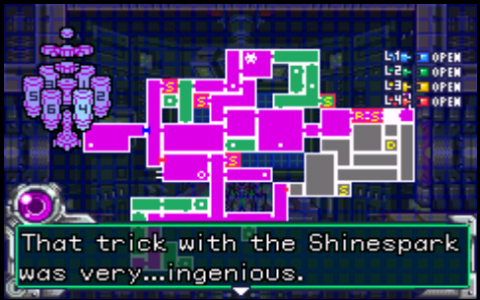
Metroid-vania
The large scale of Metroid-vania games has always appealed to me: the many rooms to explore, the many paths to take, the seemingly infinite course. Metroid Fusion is no different. Setting out with the knowledge that there is an expansive realm ahead is a good feeling.Security rooms
Finding the hidden security rooms is an interesting experience. By in large the path is reasonably hinted at. There are instances where something goes terribly awry, and it’s possible to head in a tangential direction. That is, in fact, the point of having the rooms hidden, so it’s by no means unwelcome. Anxious players may find themselves turning to a walkthrough, however.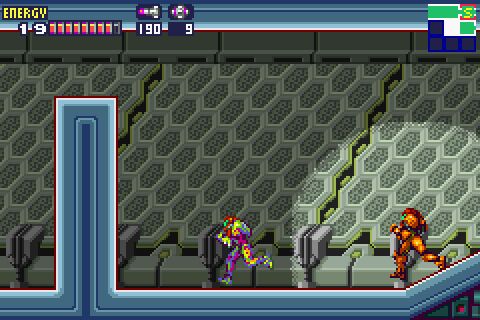
Fear the SA-X
Perhaps the best designed part of Metroid Fusion is Samus’ clone, labeled ‘SA-X’ by the computer CO. The strong force of the SA-X and the massive threat posed by it creates for a very terrifying atmosphere every time the SA-X appears on screen. The game does a very good job of making the player fear the SA-X, and conveying the message that one should fear this menace. That fear is palpable.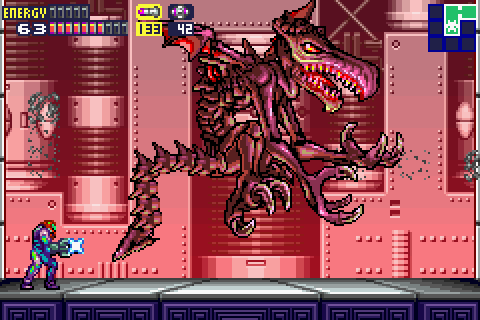
The boss battles are very one-dimensional
I was struck by how one-dimensional every boss battle in this game is. It’s quite bizarre; even jarring from a modern perspective. Each battle essentially boils down to this: fire the most powerful weapon at each boss’ vulnerable point. There’s no variation, and the conclusion of each battle sees the player fights a spine-covered globe in order to earn another power. To be quite honest, the environments are more testing than the boss fights. Some of the boss fights are frustrating, but once the patterns are learned and the solution is found, the door opens itself.Good sound effects
I cannot speak as to what the high watermark is for sound effects for Game Boy Advance games, but I found Fusion’s sound effects to be quite acceptable. The depth of noise is impressive. Each action on screen, whether carried out by Samus or by the full bestiary of enemies, seems to have its own sound effect assigned to it. I was surprised (maybe naively) by the fact that footsteps have sound effects. There are plenty of modern games that don’t have good footstep noises and plenty which should but don’t have any at all, but this game does well.The music is okay
A wisp of a bad taste mars my appreciation of the music. I largely find that about a quarter or a third of the tracks are listenable to, and the rest don’t convince me. They seem to be composed of pops, hisses, and bleeps; the tracks bring to mind ill-fated Game Boy Color compositions. Though the composers here, Minako Hamano and Akira Fujiwara, have made valiant attempts to appropriate Super Metroid tunes and others from the franchise, not everything turns out well, and that’s regrettable. Some of it is quite fitting, but as a whole the music seems to me dominated by mediocre tunes. I am somewhat amazed this game saw the release of a CD soundtrack. Nevertheless, here are three tracks I think notable:6. Environmental Tension
‘Environmental Tension’ prompts me to think of Japanese film scores from the mid 1900s, in particular scores for jidai-geki (period pieces). It’s the heavy drums that evoke this. In particular I’m thinking of the title music for Seven Samurai.
18. Sector 1 (SRX)
The heavy drum motif recurs throughout the soundtrack. This is one of the cases where the lengthy run of gameplay music works for the game. I particularly like the crescendo midway through and then the subsequent return. The buzzing and fuzziness I dislike from the soundtrack in general are present in this song -- the bass didn’t turn out right across the game -- but I think it works well for this track.
28. Sector 4 (AQA)
I like ‘Sector 4 (AQA)’, because I think it’s the progeny of those fantastic new wave NES and SNES soundtracks I adored some time ago (and still adore). The original track has been well appropriated in this case, and the bass isn’t quite the nemesis it is in other tracks.
Graphics and animation
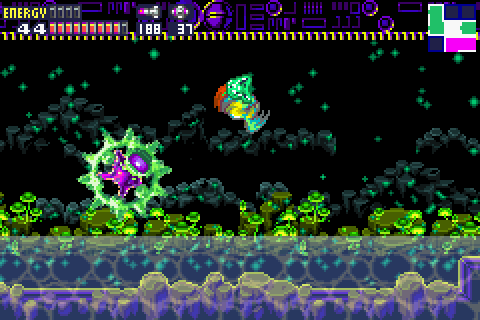
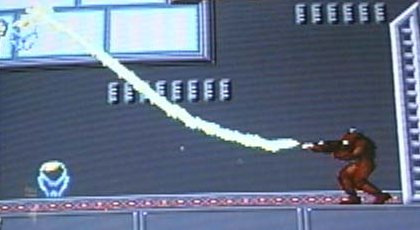
The bright aesthetic is irritating
The bright aesthetic of Metroid Fusion has likely carved channels in many people’s retinas. The game generally looks like an array of different Duplo blocks amassed together. It is scarcely one of the best-looking Game Boy Advance games. Samus’ suit alone looks like something well entrenched in the mid-80s. The elemental environments contrast with the rest of the game, for the ice and the fire areas are quite attractive. Everything else requires some work. It’s not the sprites or the graphics themselves which I find offensive; it’s the actual aesthetic. It’s much too bright and much too flashy, and it doesn’t quite work from a modern standpoint.Gameplay
Jumping is heavy
The jumping is heavy, which will not surprise veterans of the franchise, but I found it rather unsettling for the first thirty minutes. However, I was relatively accustomed with Samus’ weight after that thirty minute mark. Despite still having some difficultly in consistently hitting rolling jumps (as opposed to normal jumps) in high pressure moments, I was not at all nonplussed by the jumping at the conclusion of the game.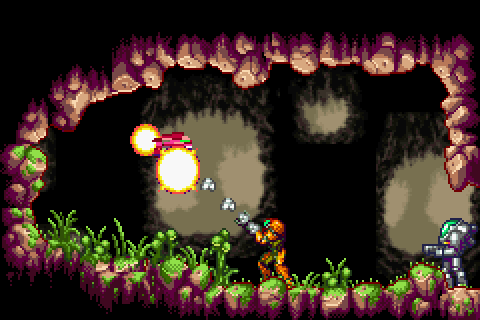
Learn to die
I found the frequency at which I was dying to be quite jarring, at least until I built up enough health to pose some resistance against enemies. My expectations have been morphed by games today in that I won’t die, and in that health, whether through pickups or regeneration, will be easy to come by, but that is not at all the case in Metroid Fusion. I find it hard to speak to this with regards to this game. Many would say that this is precisely the point of the game, and that it is meant to be hard in this manner. But I would be lying if I was to say that I was fully enjoying the game 100% of the time, or even 75% of the time. The game can be a pleasant experience, but there are certainly infuriating moments which left me somewhat soured. The average 2010 game player is not accustomed to such difficulty. Can Metroid Fusion justly be criticized because facets of it are products of a bygone era? Perhaps not fundamentally, but from a 2010 lens it most assuredly can. This game’s difficulty curve (what it expects the player to achieve) is frighteningly steep, and it comes off worse for wear because of it.There are things the player will never work out
I’m not sure how the player is expected to guess some of the different tasks in the game, such as killing some enemies and not collecting their Xs so that the Xs form other enemies, or waiting around for a set time in an area, or killing some enemies but sparing others. None of that is ever explicitly defined in-game, and while much of that is implemented where taking the path is optional, in at least two instances these ‘puzzles’ are used to block the main path.The ability to change the environment plays well
This is a staple of platformers, but Metroid provides such a variety of weapons, and such a variety of different things to affect, that it leads this particular gameplay mechanic to stand out, even in modern times.The screw attack is a fine weapon
The screw attack is a fine weapon; it always has been. I found it to be a tremendous relief as soon as I regained it, because no enemy can oppose it, and the screw attack makes the game significantly simpler.Story
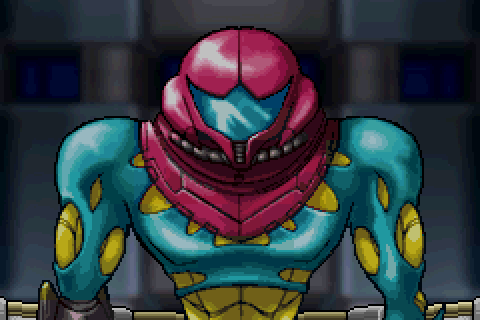
Both the story and the writing are okay
The Metroid franchise seats much more focus on the experience and the refined gameplay than either the story that justifies the game or the writing which communicates that story. For this reason, the developer could be forgiven for not dedicating development time or gameplay time to the story, but in this case Nintendo R&D1 vested both in Fusion, and the results are positive. The story that is present is largely utilitarian but interesting nonetheless. The writing is surprisingly cogent and, while by no means astonishing, has much better phrasing than I expected to meet.The CO
The idea behind the computer Commanding Officer is sound. Although it may seem quite helpful at first, the CO is always malevolent. Through the course of the game the realization dawns on the player that something is not quite right with the machine and this suspicion is solidified mid-way through when its traitorous nature is revealed. It is of course a played plot twist, a story point that has been very much reused over time, let alone by video games so far this century. Perhaps the dull blow is softened by the fact that the twist is visible almost from the outset.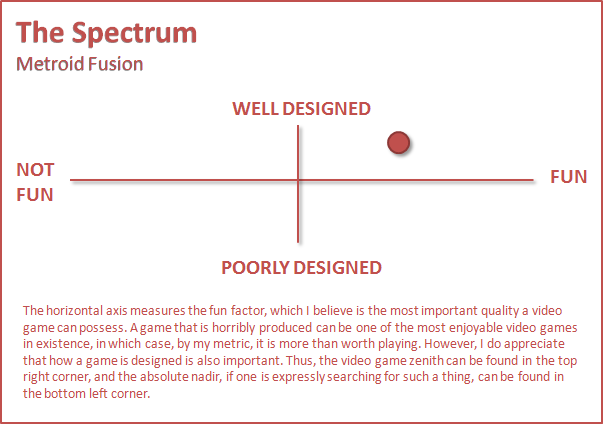

15 Comments